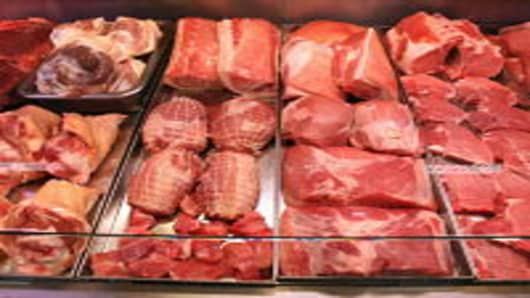The main producer of "pink slime" and the politicians defending the company will have a hard time persuading consumers and grocery stores to accept the product, even if the processed beef trimmings are as safe as the industry insists.
Three governors and two lieutenant governors plan to tour Beef Products's plant in South Sioux City, Neb., Thursday afternoon to show their support for the company and the several thousand jobs it creates in Nebraska, Iowa, Kansas, South Dakota and Texas.
Beef Products, the main producer of the cheap lean beef made from fatty bits of meat left over from other cuts, has drawn extra scrutiny because of concerns about the ammonium hydroxide it treats meat with to slightly change the acidity of the beef and kill bacteria. The company suspended operations at plants in Texas, Kansas and Iowa this week, affecting 650 jobs, but it defends its product as safe.
While the official name is lean finely textured beef, critics dub it "pink slime" and say it's an unappetizing example of industrialized food production. That term was coined by a federal microbiologist who was grossed out by it, but the product meets federal food safety standards and has been used for years.
Larry Smith, with the Institute for Crisis Management public relations firm, said he's not sure the makers of pink slime — including Cargill and BPI — will be able to overcome the public stigma against their product at this point.
"I can't think of a single solitary message that a manufacturer could use that would resonate with anybody right now," Smith said.
The politicians who plan to tour the plant — including Texas Gov. Rick Perry, Iowa Gov. Terry Branstad, Kansas Gov. Sam Brownback, Nebraska Lt. Gov. Rick Sheehy and South Dakota Lt. Gov. Matt Michels — all agree with the industry view that pink slime has been unfairly maligned and mislabeled.
"Our states proudly produce food for the country and the world — and we do so with the highest commitment toward product safety," the governors said in a joint statement. "Lean, finely textured beef is a safe, nutritious product that is backed by sound science." Branstad has said he plans to eat some of the meat to demonstrate that it's safe.
Russell Cross, who is a former administrator of the USDA Food Safety and Inspection Service, said this product is getting a bad rap from a food safety standpoint.
"I'm not saying it's perfectly safe. Nothing is perfectly safe. All food is going to have bacteria in it. But this product has never been in question for safety," he said.
Cross said that ammonia is just one tool designed to reduce bacteria and help make the food safer. The process Cargill uses, by comparison, uses citric acid to achieve similar results to what BPI does with ammonia.
The finished product contains only a trace of ammonia, as do many other foods, and it's meant just to be an additional "hurdle for the pathogens," said Cross, who is now head of the Department of Animal Science at Texas A&M University.
The ammonium hydroxide BPI uses is also used in baked goods, puddings and other processed foods.
National Meat Association spokesman Jeremy Russell said if consumers insist on eliminating this product from ground beef, prices will go up and lean beef trimmings will have to be imported to replace it. The process of creating lean, finely textured beef yields about 12 to 15 pounds of additional meat per animal.
Russell said the pink slime outcry has already hurt BPI and other meat companies, and could eventually hurt the price that ranchers and feedlots receive for cattle. "It's costing them and other companies a lot of money," Russell said.
BPI did get some good news Wednesday when Iowa-based grocer Hy-Vee said it would offer beef with and without pink slime because some consumers demanded the option. But larger grocery store chains, such as Kroger, have stuck with their decisions to stop offering beef with pink slime.
The real test for the future of BPI and pink slime may come later this year when school districts purchase meat from the U.S. Department of Agriculture for next school year. The USDA said earlier this month that it would give school districts a choice between 95 percent lean beef that contains pink slime and less-lean beef without it.
Russell said school districts will have to decide whether they're willing to spend roughly 16 percent more for beef without pink slime.
The USDA this year is contracted to buy 111.5 million pounds of ground beef for the National School Lunch Program. About 7 million pounds of that is from BPI.


